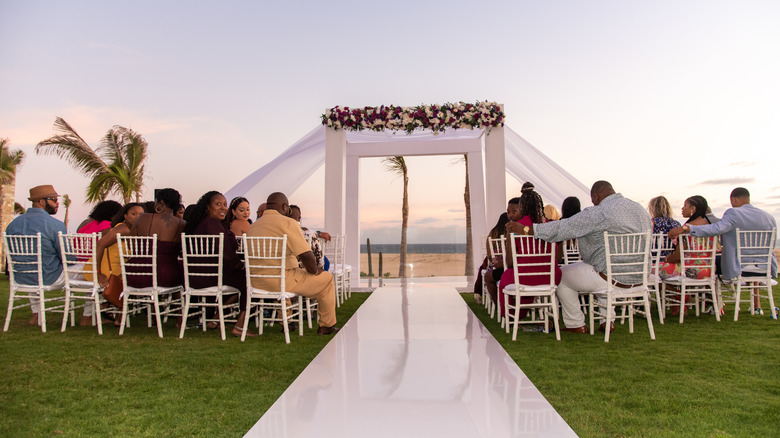Travel Guides Couples Wedding And Honeymoon
Lauren Richards
Destination weddings bring a thrilling sense of adventure to romance. For couples who love to travel, it’s a perfect way to combine that passion with your love life and share it with family and friends. It’s a monumental, celebratory moment — why not make it memorable for everyone by choosing a scenic spot?
As wonderful and serene as destination weddings can be, planning them usually is not as peaceful. In fact, it’s often the total opposite. Crunching numbers to fit within budgets and choosing dates that work for everyone can feel impossible. Getting invites out, waiting on RSVPs, choosing a venue — it can get overwhelming. However, being aware of common mistakes can help guide you through the process, as it gives you a template of what to do and what not to do.
One key mistake to avoid is giving a total cost estimate to the guests. While this might seem like a courteous thing to do, it can actually be more harmful than helpful. By diving deeper into why you shouldn’t give a cost estimate to your guests for your destination wedding — and what you should do instead — you’ll likely have a smoother wedding planning experience (and your guests will thank you!).
Why you shouldn’t give a cost estimate to your guests (and what to do instead)

Prostock-studio/Shutterstock
It’s difficult to give an accurate cost estimate for guests for a variety of factors, but largely because prices so often fluctuate. “It’s really hard to estimate a budget, and costs are unpredictable that far ahead,” owner of AMV Weddings Amanda Virga told Fodor’s Travel. “[For example,] flights will double in price and then drop.” Instead of doing the guesswork for your guests, give them some room to figure out what works for them.
You can do this by outlining the costs that likely will not change, namely, room rates. There is the possibility of getting your guests a negotiated rate, that is, of course, if the hotel or resort you’re booking with agrees to it. Additionally, you might want to provide a list of activities and their costs. If you choose to do this, double-check and make sure the rates won’t go up with the new season.
Once you have a venue selected and a hotel or resort you’d like to choose, send out invitations immediately. Try to send them out at least 12 months in advance. This gives your guests an idea of how much they should expect to pay on the basics and plenty of time to budget accordingly and scout out the best prices on airfare.
Communicating with your guests

Paul Bradbury/Getty Images
Communication is key when it comes to destination weddings. Let your guests clearly know the costs you plan to take on vs. the costs they’re expected to cover. Do you have any special activities planned where you’ll pay for everyone?
“There’s no rule for this category,” Sabrina Cadini, founder of wedding planning service La Dolce Idea, tells WeddingWire with regard to paying for extra activities for the guests. “However, the couple should pay for at least one in order to encourage the majority of guests to participate.” Regardless of what you choose, let them know what perks they’ll receive at no cost so they can create a more accurate budget for themselves.
In addition to letting them know what you’ll be covering (if anything), give them any information you would also provide to tourists in case they want to explore for a few days before or after your wedding. Let them know currency rates, what activities are nearby, what the area is known for, if tips are expected, the area’s history, and anything else they may need to know; this can help them financially prepare without giving them a hard estimate.

